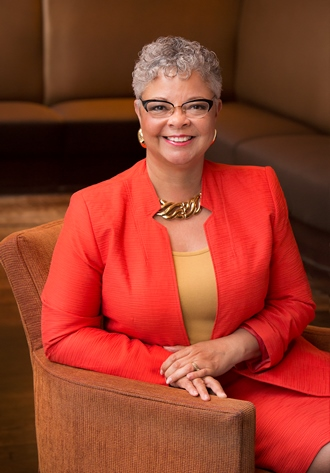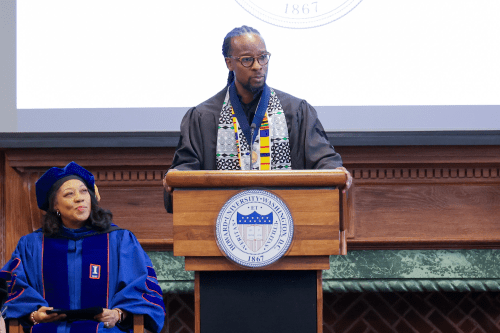
WASHINGTON (June 5, 2019) – The Howard University Center for Sickle Cell Disease will hold its sixth annual World Sickle Cell Day Symposium on Wednesday, June 19. The event will highlight the Howard University “Cure Sickle Cell Now Initiative” (#CureSickleCellNow) and feature patients and experts who are seeking to spur scientific research into the disease. The federal government announced in September a new initiative to find a universal cure for sickle cell disease.
The symposium is scheduled from 1 p.m. to 4 p.m. at Howard University Hospital, Walter Lester Henry auditorium, 2041 Georgia Ave, NW. This year marks the 10th anniversary of the declaration of World Sickle Cell Day by the United National General Assembly. The Howard symposium's featured speaker is Freda C. Lewis-Hall, M.D., chief patient officer and executive vice president of Pfizer, and Howard University alumna.
“The Howard University #CureSickleCellNow is a call to action to raise awareness and educate the community about the national drive to cure the disease. We want to let our patients know there is hope on the horizon,” said James G. Taylor, M.D., director of the Center for Sickle Cell Disease. “All of the speakers and panelists are razor-focused on the topic and intimately involved in sickle-cell work.”
The World Sickle Cell Day symposium will also include a roundtable panel discussion with patients who have taken part in clinical trials. Along with its history of treating a high volume of patients, the Howard University Center for Sickle Cell Disease has participated in every major clinical trial that has led to FDA approved medications for sickle cell disease. Clinical trials are vital to the effort to find a cure.
Tesha Samuels, of Bethesda, Md., will speak about her experiences in an NIH trial at the Howard symposium in the hopes of getting the word out about the importance of clinical trials.
“It was a very long and at times painful experience,” Samuels said. “However, I believe it has been truly life changing. There are researchers and doctors who are working on cutting-edge research to try to eradicate this debilitating illness. Clinical trials are important for doctors, scientists, and researchers to gain knowledge about how the disease effects and us.”
Pfizer’s, Dr. Lewis-Hall has been on the frontlines of health care as a clinician, a researcher, and a leader in the biopharmaceuticals and life sciences industries. Prior to joining industry, she served as vice chairperson and associate professor in the Department of Psychiatry at Howard University College of Medicine and was an advisor to the National Institutes of Mental Health. She earned her medical doctorate at Howard University College of Medicine.
W. Keith Hoots, M.D., director, Division of Blood Diseases and Resources, National Heart, Lung, and Blood Institute at the NIH, will also address the gathering. The agency he represents funds and sets the agenda for research policy related to diseases and health.
Edward J. Benz Jr., M.D., president and CEO emeritus at Dana-Farber Cancer Institute and an internationally recognized hematologist who is an active National Institutes of Health-funded investigator, is additional featured speaker. Dr. Benz is chair of the Sickle Cell Advisory Committee charged with setting policy for curing the disease.
Dr. Taylor says clinical trials are key to scientific progress to cure the disease.
“If we don’t do the trials and experiments, we are not going to make progress,” he said.
“We need patients to be willing to participate in drug and other trials, where appropriate. We see that minority populations are often reluctant to participate in trials. However, Howard has a long tradition of enrolling people and working hand in hand to ensure successful clinical relationships.”
Howard University’s Center for Sickle Cell Disease was founded in 1972 by the late Roland B. Scott, M.D. and has a distinguished history of leading clinical investigation in sickle cell disease. Sickle cell disease is a hereditary blood system disorder prevalent in African Americans and many other people of African descent throughout the world.
Sickle cell disease is a group of blood disorders typically inherited from a person’s parents and the most common type is known as sickle cell anemia. The disease begins around the age of five to six months and a number of health problems may develop such as pain, anemia, swelling in the hands and feet, bacterial infections and stroke. Around the world, about 4.4 million people have sickle cell disease and 43 million have the sickle cell trait.
Be the Match: To see if you could be someone’s cure for sickle cell disease or blood cancer just by donating your stem cells (similar to a platelet/plasma donation), go to join.bethematch.org/CURE44 or text CURE44 to 61474. For more information please contact Beth Carrion @ ecarrion@nmdp.org or 210-214-7130.
For media inquiries, please contact Sholnn Freeman, Howard University communications, sholnn.freeman@howard.edu
About Howard University
Founded in 1867, Howard University is a private, research university that is comprised of 13 schools and colleges. Students pursue studies in more than 120 areas leading to undergraduate, graduate and professional degrees. The University operates with a commitment to Excellence in Truth and Service and has produced four Rhodes Scholars, 11 Truman Scholars, two Marshall Scholars, one Schwarzman Scholar, over 70 Fulbright Scholars and 22 Pickering Fellows. Howard also produces more on-campus African-American Ph.D. recipients than any other university in the United States. For more information on Howard University, visitwww.howard.edu.




